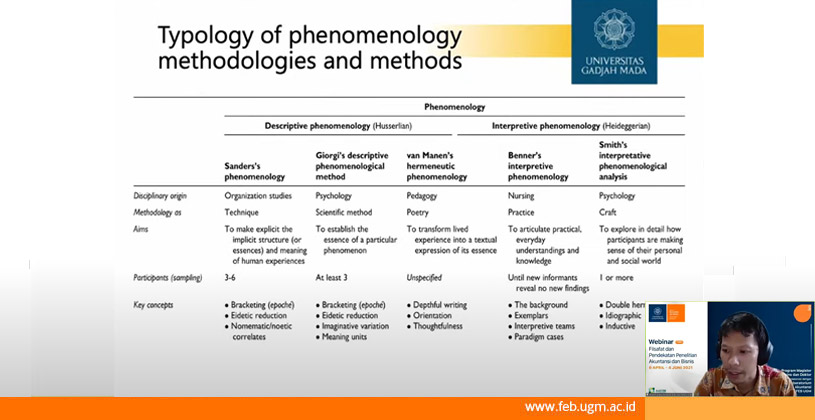Phenomenology: What we perceive is not always the same as what we feel
- Details
- Written by Kirana
- Category: News
- Hits: 1856

The introduction and understanding of the philosophy and research approach is very important for researchers in conducting research. This is the essence of holding a webinar series with the theme "Philosophy and Approaches to Accounting and Business Research" by the Accounting Laboratory, Department of Accounting, FEB UGM together with the Master of Science and Doctoral (MD) Study Program of FEB UGM which consists of 7 series and discusses various different paradigms for each session. On Friday (30/04), the fourth session of the webinar series was successfully held discussing the philosophical and methodology aspects of the phenomenology paradigm as the topic.
Phenomenology can be defined as the study of a person's life experiences or a method for studying how individuals subjectively experience and give meaning to these phenomena. This explanation was given by Rijadh Djatu Winardi, S.E., Ak., M.Sc., CFE as the speaker on the occasion. According to Rijadh, often what we perceive will be different from what we feel. "Phenomenology tries to capture not only what we perceive in our senses, but also tries to study the structure of our thoughts about an object we see," he added.
Based on his explanation, the phenomenological paradigm is also closely related to the study of consciousness. Several methods can be applied in conducting conscious experience studies by describing them or interpreting them by relating it to relevant context. According to Husserl regarding pure/transcendental phenomenological theory, there are 6 key concepts, namely intentionality, noema, noesis, epoche (phenomenological reduction), eidetic reduction, and the essence of experience.
Meanwhile, according to Heidegger regarding the theory of hermeneutic phenomenology, reduction is not possible and to understand the phenomenon it is necessary to know the individual who experienced the experience. Different from the previous theory, interpretation is an integrated part in understanding this paradigm according to hermeneutic phenomenology. In addition, phenomenology as a methodology can be divided into descriptive and interpretive phenomenology.
At the end of his presentation, Rijadh also explained the strengths and limitations of the phenomenological paradigm. The phenomenological paradigm is considered suitable for developing an understanding of complex issues and is also a powerful tool for generating an understanding of lived experiences and human existence. This paradigm also allows opportunities to expand the research boundaries and enrich the empirical data from a study. On the other hand, phenomenology can be "daunting" because of the need to understand aspects that are somewhat difficult and large amounts of data. Phenomenology can also limit the generalizability of results and put into question the objective “truth” of any conclusions drawn.
Reportage: Kirana Lalita Pristy/Sony Budiarso.


